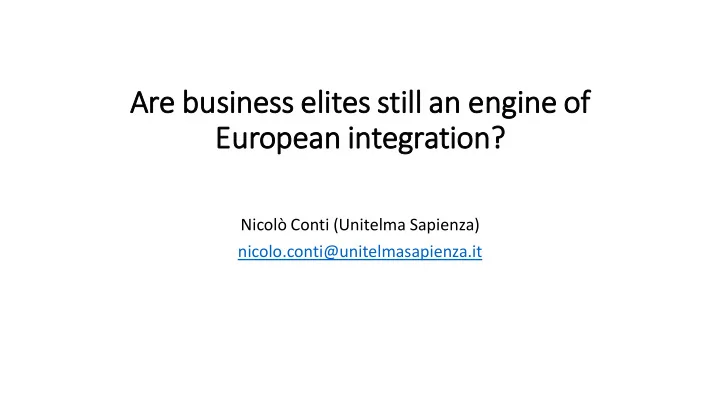

Are e bus business eli elites still till an an eng engin ine of of Eur European integ egratio ion? Nicolò Conti (Unitelma Sapienza) nicolo.conti@unitelmasapienza.it
Setti ting the the grou ound • Business elites as central actor for EU integration • Yet, in the literature they received way less attention than (supra)national political elites and the public • A gap justifed by the assmption that business elites should be ‘naturally’ in favour of EU integration • It is important to study the EU attitudes of business elites in times of discussion about the role of the economy in EU integration (and in times of growing Euroscepticism within society) • EUENGAGE data: A Europe-wide project (10 countries, more than 1,000 business elite members [CEOs, etc.] interviewed)
Th Theory ry • The broad literature on trade preferences mainly influenced by political economy that emphaises the role of calculation and utility maximisation , where business demands are deduced from models predicting differential benefits from trade by analyzing production conditions • We embed theory on economic conditions in a broader framework about EU attitudes at elite level, for this purpose we import some conjectures from the empirical literature on EU attitudes focusing on the role played by the following factors: ideology, trustworthiness of the EU system and identity
Th Theory ry and and hypotheses CALCULATION IDEOLOGY, TRUSTWORTHINESS, IDENTITY • H1 – Believing that the EU has been beneficial to • H5 – More liberal attitudes positively influence the business community positively influences business elites’ attitudes towards European business elites’ attitudes towards European integration (Liberalism Hypothesis). integration (Business Hypothesis). • H6 – Extreme political attitudes negatively • H2 – Believing that the EU has been beneficial to a influence business elites’ attitudes towards country positively influences the attitudes towards European integration (Extremism Hypothesis). European integration of those business elites • H7 – Satisfaction with how democracy works in the working in the same country (Country Hypothesis). EU positively influences business elites’ attitudes • H3 – Working in a larger firm positively influences towards European integration (Satisfaction business elites’ attitudes towards European Hypothesis). integration (Company size Hypothesis). • H8 – A cosmopolitan identity positively influences • H4 – Working in service markets negatively business elites’ attitudes towards European influences business elites’ attitudes towards integration (Cosmopolitanism Hypothesis). European integration (Company sector Hypothesis).
Res esult lts • H1/H2/H5/H7/H8 –– confirmed • H3/H4/H6 – disconfirmed
Con onclusions • EU business elites not a monolith in their EU attitudes but they appear rather fragmented across (and also within) countries • End of ‘permissive consensus’ also at the business level? Longitudinal data needed! • Similarity of factors influencing business elites and the public • The ways in which business elites shape their attitudes towards the EU appear not so different from those of public opinion, whose stance is normally influenced by a mix of factors, primarily by instrumental calculation, trustworthiness, identity and ideology (Hooghe and Marks 2005). Here as well, business elites appear influenced by (benefit) calculation, (EU) trustworthiness, (cosmopolitan) identity and (economic) ideology.
Con onclusions • Contrary to expectations rooted in the political economy theory, the structural properties of the firm where business people operate does not correlate with their EU attitudes, individual level perceptions and predispositions are instead more influential • Interesting effect of more ’social - oriented attitudes’, the following preferences foster more positive EU attitudes: • increasing public investments • pooling national resources to fight economic problems • more solidarity between the richest/poorest member states to fight crises
Recommend
More recommend